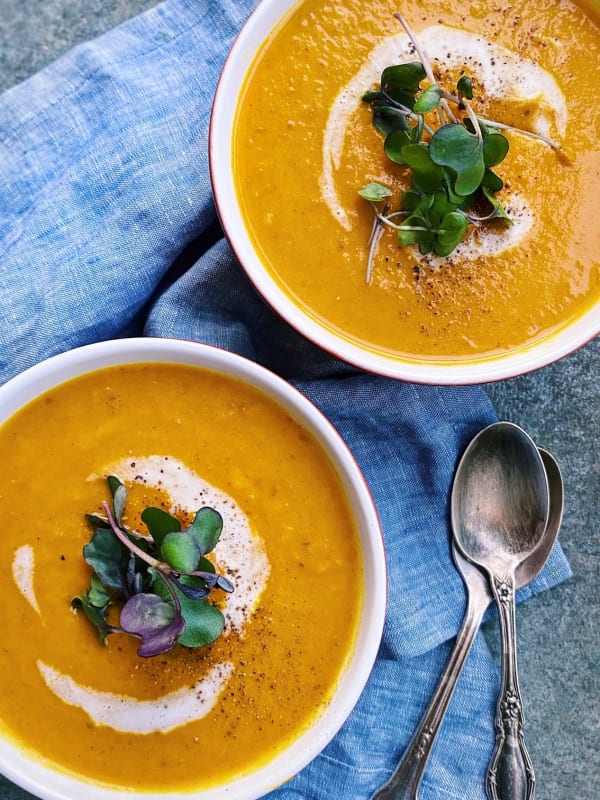Popular Conditions & Diets

As versatile as it is vibrant, the humble carrot can do almost anything and go almost anywhere. Summer salad, winter stew, home cooking, haute cuisine- you name it. It’s no surprise that this vividly orange, subtly sweet vegetable has graced every type of plate worldwide for centuries.
Somewhat less obvious is the staggering array of phytonutrients that elevate carrots far beyond some simple snack to run through your hummus: they’re true nutrient powerhouses with a fascinating backstory, a near-endless list of culinary applications, and a host of profound health benefits that rank them among nature’s most perfect foods.

While origins remain challenging to pin down, carrots seem to have emerged from Central Asia. Historically, the first farmed carrots were mostly purple- and 5000-year-old remnants of these can be found in Afghanistan. Before cultivation, wild carrots were likely picked mainly for the medicinal value of their leaves and seeds.

The cross-section of a chopped carrot resembles an eye, which vis-a-vis the Doctrine of Signatures implies that carrots are beneficial for ocular health- and they are. Carrots are rightly renowned for their excellent beta-carotene content, which the body converts into vitamin A, and this is a key nutrient for supporting healthy vision. Beta-carotene is even named after carrots, making it one of the only vitamins (or provitamins, technically) to take its name from a food.
Boosts Eye Health: The well-known vision-related benefits of carrots are worth emphasizing. Beta-carotene helps prevent macular degeneration, while lutein and zeaxanthin protect the retina from blue light damage. However, it’s better to get these compounds - especially beta-carotene - from food as opposed to supplements. Skip the pill and eat the carrot.
Carrots are fairly unique in that they contain high doses of polyacetylenes, a chemical family that includes falcarinol and falcarindiol. These remarkable compounds have been shown to and . The fibre content in carrots also helps by binding to bile acids, which the body then expels, balancing cholesterol levels. Eating carrots has also been and other risk factors. Generally speaking, and stay healthier for longer.

The health-promoting carrot compounds that do so much for our health might be microscopic, but they are not invisible: they are the whole reason carrots are so vividly pigmented. With black, purple, yellow, red, and white carrots making a resurgence at supermarkets, it’s easier and easier to get a breadth of phytochemistry in the shopping cart.

Carrots fly below the radar as a fairly pedestrian vegetable, but this article is a plea not to take them for granted. Whether you’re tossing them into a salad, blending them into a smoothie, or dicing them into a mirepoix, remember that they’re doing some real heavy lifting, healthwise.
Al Nasser, Y., Jamal, Z., & Albugeaey, M. (2023). Carotenemia. In StatPearls. StatPearls Publishing.
Carrots: History, cultivation, benefits, and delicious recipes. Les Chats Gourmets - Recettes de cuisine. (2024, June 14). https://leschatsgourmets.com/en/culinary-readings/15394-carrots-history-cultivation-benefits-and-delicious-recipes/
Deding, U., Baatrup, G., Kaalby, L., & Kobaek-Larsen, M. (2023). Carrot Intake and Risk of Developing Cancer: A Prospective Cohort Study. Nutrients, 15(3), 678. https://doi.org/10.3390/nu15030678
History of carrots. Carrot History - Origin and History of Carrots. (n.d.). https://www.vegetablefacts.net/vegetable-history/history-of-carrots/

After spreading from Persia to Spain, the bitter, wild varieties eventually drifted through continental Europe, West Asia, and India by the 10th century. By the 12th century, red and yellow carrots were commonly cultivated in Andalusia, and by the 13th, they had reached as far as Japan.
Though wild carrots were evidently very familiar to ancient Greeks and Romans, the more palatable domestic versions didn’t reach British shores until the 1400s. It took hundreds of years and many selectively bred generations to remove the harsh bitterness and perfect the juicy sweetness we take for granted today.
The historical advent of orange carrots is a matter of some dispute. According to one version of events, orange carrots appeared in the 17th century when Dutch farmers selectively bred the vegetable as a tribute to Prince William of the House Orange, who led the nation in a war of independence against Spain. In another account, the selective breeding process that made them more palatable also happened to increase carotenoid content, turning them orange- and only afterward were they associated with William of Orange.
The association between the two was made famous during World War II when the British claimed their pilots’ excellent nocturnal targeting was all thanks to high carrot consumption. This wasn’t actually true, but it made for a convenient cover story to keep British radar technology hidden from German attention. Nevertheless, the cultivated wartime myth persists that carrots support optical health and can even help you see in the dark.
But sharp vision is just the beginning. A single cup of chopped carrots provides a whole day’s supply of vitamin A, along with vitamins C, K, and B6. They’re also generously endowed with potassium, the soluble fibre pectin, and the extremely powerful antioxidants lutein and zeaxanthin, which further support healthy vision and protect against system-wide oxidative stress.
Equally alluring is the effect of carrot consumption on our skin. Thanks to the beta-carotene, regularly eating carrots can slow the appearance of aging and give skin a healthy, subtle glow. While too much beta-carotene can lead to a temporary orange tint called carotenemia, a moderate intake of carrots is associated with a reduction in sun damage and a boost to overall skin radiance.
Aids in Weight Management: Carrots are low in calories, but the high fibre and water content make them disproportionately satisfying and satiating. Raw carrots in particular have an extremely low glycemic index, which means they won’t cause a spike in blood sugar or insulin, making them a great option for those looking to manage their weight and blood sugar levels.
Boosts Immunity: With a potent mix of antioxidants, vitamins, and minerals, carrots support the immune system in multiple ways. Vitamin C stimulates the production of white blood cells, which are essential for fighting infections. Antioxidant carotenoids also help reduce inflammation and support the body’s overall immune response. An intriguing, lesser-known compound extracted from carrots called rhamnogalacturonan has recently been shown to treat viral respiratory infections with profound efficacy.
And, each colour has its own unique proportion of healthy nutrients: purple and black carrots, for example, are richest in anthocyanins, powerful antioxidants that reverse inflammation, support heart health and protect cognitive function. Red carrots boast the most lycopene, which has been linked to reduced risk of certain cancers, while yellow carrots are highest in lutein, working with beta-carotene to promote eye health. As for the classic orange variety, it contains roughly ten times more carotenoids than are found in the yellow and purple.
In the end, carrots are anything but a filler vegetable or low-calorie snack; they’re a vibrant, nutrient-dense superfood that offers a host of benefits for the body, mind, and even the skin. So next time you’re at the grocery store, don’t forget to pick up a bunch of these bright orange beauties- and maybe a few of the more exotic colours, too.
Lutter, R., Teitsma-Jansen, A., Floris, E., Lone-Latif, S., Ravi, A., Sabogal Pineros, Y. S., Dekker, T., Smids, B., Khurshid, R., Aparicio-Vergara, M., Ruijschop, R., Ravanetti, L., Calame, W., Kardinaal, A., & Albers, R. (2021). The Dietary Intake of Carrot-Derived Rhamnogalacturonan-I Accelerates and Augments the Innate Immune and Anti-Viral Interferon Response to Rhinovirus Infection and Reduces Duration and Severity of Symptoms in Humans in a Randomized Trial. Nutrients, 13(12), 4395. https://doi.org/10.3390/nu13124395
Mandrich, L., Esposito, A. V., Costa, S., & Caputo, E. (2023). Chemical Composition, Functional and Anticancer Properties of Carrot. Molecules (Basel, Switzerland), 28(20), 7161. https://doi.org/10.3390/molecules28207161
The multi-colored history of carrots. Food Literacy Center. (n.d.). https://www.foodliteracycenter.org/broccoli-beet-year/multi-colored-history-carrots
Ojobor, C. C., O'Brien, G. M., Siervo, M., Ogbonnaya, C., & Brandt, K. (2023). Carrot intake is consistently negatively associated with cancer incidence: A systematic review and meta-analysis of prospective observational studies. Critical reviews in food science and nutrition, 1–13. Advance online publication. https://doi.org/10.1080/10408398.2023.2287176
Pezdirc, K., Hutchesson, M. J., Williams, R. L., Rollo, M. E., Burrows, T. L., Wood, L. G., Oldmeadow, C., & Collins, C. E. (2016). Consuming High-Carotenoid Fruit and Vegetables Influences Skin Yellowness and Plasma Carotenoids in Young Women: A Single-Blind Randomized Crossover Trial. Journal of the Academy of Nutrition and Dietetics, 116(8), 1257–1265. https://doi.org/10.1016/j.jand.2016.03.012
Roberts, J. E., & Dennison, J. (2015). The Photobiology of Lutein and Zeaxanthin in the Eye. Journal of ophthalmology, 2015, 687173. https://doi.org/10.1155/2015/687173
Smith, K. A. (2013, August 13). A WWII propaganda campaign popularized the myth that carrots help you see in the dark. Smithsonian.com. https://www.smithsonianmag.com/arts-culture/a-wwii-propaganda-campaign-popularized-the-myth-that-carrots-help-you-see-in-the-dark-28812484/
Soleti, R., Coué, M., Trenteseaux, C., Hilairet, G., Fizanne, L., Kasbi-Chadli, F., Mallegol, P., Chaigneau, J., Boursier, J., Krempf, M., Geoffriau, E., Andriantsitohaina, R., & Ouguerram, K. (2021). Carrot Supplementation Improves Blood Pressure and Reduces Aortic Root Lesions in an Atherosclerosis-Prone Genetic Mouse Model. Nutrients, 13(4), 1181. https://doi.org/10.3390/nu13041181
Tastes Of History. (2024, February 15). A brief history of food: The carrot. Tastes Of History. https://www.tastesofhistory.co.uk/post/a-brief-history-of-food
Wisker, E., Schweizer, T. F., Daniel, M., & Feldheim, W. (1994). Fibre-mediated physiological effects of raw and processed carrots in humans. The British journal of nutrition, 72(4), 579–599. https://doi.org/10.1079/bjn19940061
Wright, O. R., Netzel, G. A., & Sakzewski, A. R. (2013). A randomized, double-blind, placebo-controlled trial of the effect of dried purple carrot on body mass, lipids, blood pressure, body composition, and inflammatory markers in overweight and obese adults: the QUENCH trial. Canadian journal of physiology and pharmacology, 91(6), 480–488. https://doi.org/10.1139/cjpp-2012-0349
Yang, J., Zhang, Y., Na, X., & Zhao, A. (2022). β-Carotene Supplementation and Risk of Cardiovascular Disease: A Systematic Review and Meta-Analysis of Randomized Controlled Trials. Nutrients, 14(6), 1284. https://doi.org/10.3390/nu14061284
Lead Photo by Gabriel Gurrola on Unsplash